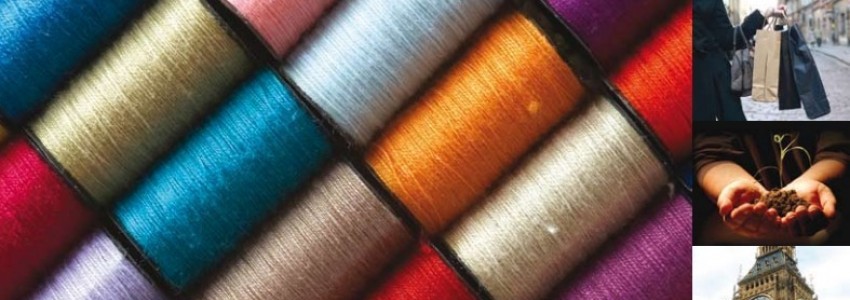Well dressed? The present and future sustainability of clothing and textiles in the United Kingdom

Our clothes are getting cheaper, they follow fashion more rapidly and we’re buying more  and more of them. At the same time, we hear more about poor working conditions in clothing factories, the greenhouse effect is becoming more threatening and the UK is facing a crisis in disposing of its waste. What should we do?
and more of them. At the same time, we hear more about poor working conditions in clothing factories, the greenhouse effect is becoming more threatening and the UK is facing a crisis in disposing of its waste. What should we do?
This report aims to help answer that question, by looking at what might happen if the way that our clothes are made and used were to be changed. What would happen if we used different fibres, or different farming practices? What would be the consequence of washing our clothes in a different way, or keeping our carpets for longer? What would happen if more of our clothes were disposed of through clothes banks?
In the UK we are already awash with information on these questions – so why read this report? Firstly, the report is intended to be neutral – it does not have an agenda, or seek to promote a particular change or approach. Secondly, it attempts to take a very
broad view of the sector – encompassing the views of business, government and campaigners and trying to reflect the widest definitions of ‘sustainability’. Thirdly, it attempts to identify the potential for significant and lasting change by looking at what might happen if a whole industrial sector were to experience a change.
The report is intended to be valuable to a wide range of interested groups. It is written for people in business – who have to balance their personal ethics and the concerns of their consumers with the need for their business to prosper. It is written for consumers
who have a limited budget but are concerned about the impact of their shopping choices. It is written for campaigners and those in education, government and the media – to try to provide as balanced evidence as possible about the present and future impacts of the clothing and textiles sector.
Five person-years of work leading to this report were funded by the Landfill Tax Credit scheme, through the Biffaward scheme administered by the Royal Society of Wildlife Trusts and with 10% funding from Marks and Spencer. On the way to writing the report, we have received help from hundreds of people working in the sector and have attempted to acknowledge many of them inside the back cover. We would particularly like to acknowledge the contributions of Marisa de Brito, who worked with us for the first half of the project, Jon Cullen who designed the graphics, sourced the photographs and edited and laid out the document, and our steering committee of Mike Barry from Marks and Spencer, Peter Jones from Biffa and David AeronThomas from Forum for the Future.
Julian M Allwood
Søren Ellebæk Laursen
Cecilia Malvido de Rodríguez
Nancy M P Bocken
Free£plus£P&P
ISBN 1-902546-29-6









